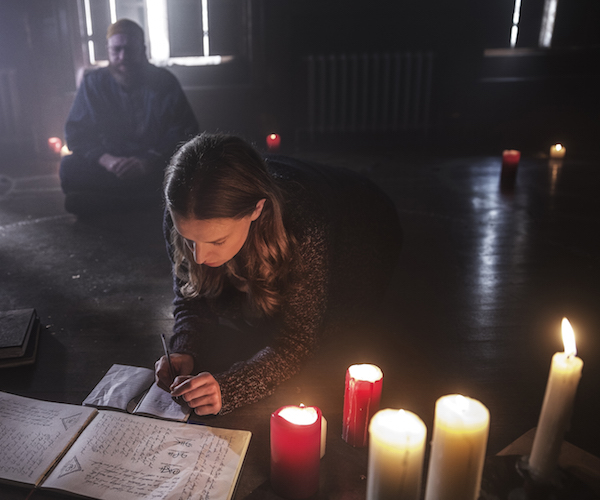Film Review: “A Dark Song” — An Occult Foray into Quiet Horror
A Dark Song’s terror lies in its slow, intense build and its overarching sense of doom.
A Dark Song directed by Liam Gavin. Screening at Coolidge Corner Theater, Brookline, MA, May 5 and 6.

Catherine Walker and Steve Oram in a scene from “A Dark Song.”
By Peg Aloi
Irish director Liam Gavin’s debut film is a thoughtful, and often disturbing, story of a prolonged occult ritual performed by two strangers. Engaging with the story does not call for a knowledge of the occult, but paying close attention to the disclosure of subtle pieces of information might well yield a more satisfying experience. The film does not coddle viewers with unnecessary exposition or detailed explanations of intricate practices; the aim is to provide an intimate lens though which to watch forbidden acts unfold in ways that range from the mundane to the mysterious. There is no indulgence in manipulative genre gimmicks. A Dark Song’s terror lies in its slow, intense build and its overarching sense of doom.
The film begins with Sophia (Catherine Walker), who is renting an enormous house located in a remote part of North Wales. (Note: I’ve spent some time in this area near Llandudno, and it’s one of the most jaw-droppingly gorgeous landscapes I’ve ever seen.) She pays the realtor a large sum of cash to ensure her privacy. A sloppily-dressed forty-something Londoner named Joseph Solomon (Sightseers’ Steve Oram) comes to check out the home, brusquely asking Sophia some questions. We learn that he is an experienced occultist whom Sophia is hiring to help her perform an elaborate ritual. At first, Solomon is diffident, even hostile, refusing to perform a rite he deems frivolous (but demanding payment nevertheless) and then, after Sophia reveals it is not a love spell, but a ritual to summon the dead that she wants him to assist with, he changes his mind. The two make plans to stay at the house for a period of months to complete the rite, with no clear idea of precisely how long it will take. Sophia’s determination to see her deceased child has become her obsession. When Sophia goes to buy the supplies they’ll need, she runs into her sister Victoria (Susan Loughnane), who worries Sophia is not well enough for such an undertaking, and that her illness might have repercussions. Sophia, bitter because her younger sister still has two children living, warns her to stay away. She is determined to do what she must.
Back at the house, a stone castle with no heating, Sophia and Joseph prepare for the rite; he pours a circle of salt around the house to “seal” it. He warns Sophia that she will not be able to leave until the rite is completed. Initially, there is a great deal of tension between them. Sophia questions Joseph’s ability; he resents that skepticism and doubts her commitment. Physical purification is necessary;. Sophia has denied herself alcohol and sex for months. Joseph suffers briefly from the DTs while he detoxes. He is forceful and cruel: he throws cold water on Sophia when she oversleeps and is unsympathetic when she becomes ill from toadstools he tells her to eat as part of her regimen. She rebels against his sadistic mistreatment, reminding him of how much money she is paying him (eighty thousand pounds). But he refuses to be questioned. Gradually the two fall into a routine, and in more relaxed moments converse and and even share jokes. Outside, where the two never venture, the seasons pass. The lonely countryside makes for an absurdly romantic backdrop; one almost suspects a costume drama of forbidden passion is in the offing. It is all palpably sensual — the mist and windblown moors, the dripping trees.
Early on there is talk of sex magic as a necessary part of the rite. Physical intimacies become part of Joseph and Sophia’s magical preparations (she shaves his back and arms, he paints Japanese symbols on her naked back by candlelight). Might carnal urges overtake them? When the moment arrives it is surprisingly pedestrian and, well, anti-climactic, given that it turns out to be a selfish diversion on Joseph’s part. Sophia is humiliated and outraged; the way forward will most likely be difficult. But as they continue with the rite, building slowly but inexorably towards its completion, a sense of intimacy is generated between them, a sort of dutiful marriage (if not an alchemical one). Or it may be they are siblings bound by fate. As the risks increase, they become protective of one another, but neither will deviate from his or her purpose. The film’s delicate placement of supernatural elements is pitch-perfect, never overwhelming its naturalistic rhythms.
I found A Dark Song absorbing and fascinating, a subtle horror tale that haunted me for weeks. The film’s atmosphere is consistently forboding without resorting to tricks of light or sound to achieve its moods. The subtle but layered score by Ray Harman is perfectly calibrated to elicit dread and pathos. The lead actors are thoroughly convincing as two desperately lonely people who seek communion by way of contacting the otherworld. Gavin’s first feature is impressive in its discipline, subtlety, beauty, and dedication to quiet horror.
Peg Aloi is a former film critic for The Boston Phoenix. She has taught film studies for a number of years at Emerson College and is currently teaching media studies at SUNY New Paltz. Her reviews have appeared in Art New England and Cinefantastique Online.
